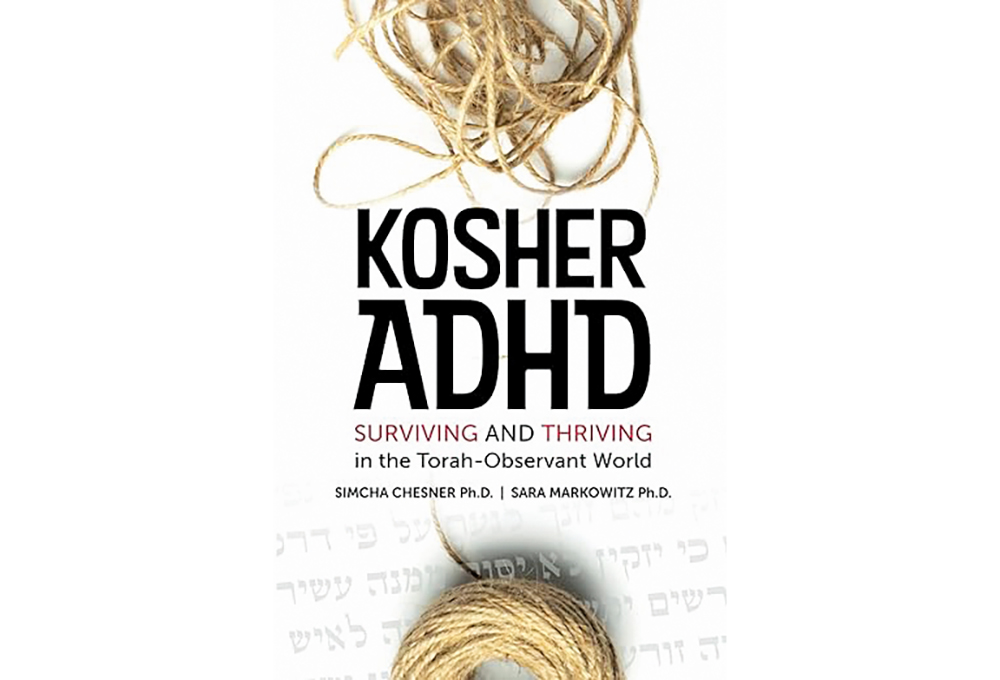
Reviewing: “Kosher ADHD: Surviving and Thriving in the Torah-Observant World” by Simcha Chesner Ph.D. and Sara Markowitz Ph.D. Kodesh Press. 2023. English. Paperback. 314 pages. ISBN-13: 979-8888940198.
I recently had a tough conversation about a child in my life. As a mom and teacher, I have many purposeful conversations about the children in my life with adults who play a variety of roles as part of the village tasked with raising the next generation. This particular conversation centered around a child recently diagnosed with ADHD and the possible next step of medicating said child. The child is compliant, distractible, and simply wants to be out of the chair, moving around while learning or to be active frequently to help focus. I told the other adult in the conversation that it felt abusive and dystopian to medicate a child to sit still when we know that it is not natural to be stuck in a chair all day.
As humans, we are built to be active and agrarian, and these very children that we are failing to understand and support properly are being medicated into compliance in this linguistically focused society. This is not to say that medication cannot play an important part in success for many children and adults, but I was pushed to reflect again on the seemingly limited and non-ideal options for many children and adults with ADHD in our Torah observant community.
Soon after this conversation, I was handed the illuminating and much-needed Kosher ADHD, and page after page I found myself breathing more easily and feeling hopeful that as a community we can stop the disenfranchisement of our most precious commodity, our children.
The authors, Simcha Chesner, Ph.D. and Sara Markowitz, Ph.D. begin the book clearly explaining the experience of a Torah-observant person with ADHD as someone who, in Ross Green’s language, lags in executive functioning skills that impacts every area of religious observance in both shul, school and their home life.
Given the empathic introduction, I plunged rapidly and deeply into the body of the text, which promised support and guidance to the adult entrusted with our progeny. The authors delve into research-based explanations and philosophies of Torah luminaries throughout the centuries to contextualize the brain wiring of people with ADHD. First, there is a succinct explanation of their struggles within a Torah framework, including but not limited to self-control, maintaining interest when instant gratification is not an option, and the “notoriously difficult” challenge of sitting for davening. The distress a person with ADHD feels when not able to achieve the expectations in class and the Shabbat table, as well as other mundane areas in their own life, can lead him or her far from their religious roots. The goal of the books is clearly to provide a compassionate and detailed plan of action to support and nurture people with ADHD.
The key points for reflection are revisited at the end of each chapter and questions provide a conduit for dialog between parents and school teams to help guide adults toward better support of individual students. Chapters also provide implementation tools and rubrics to enable adults to learn and practice the skills they need to provide better support.
The interweaving of research, Tanach personalities, and hands-on skill development for the adults present a framework for this seminal work, a veritable toolkit for all who care to better support those with ADHD in their lives. With humor and hope, the authors have created a true guide to what they have coined “Developmentally Attuned Parenting,” and I would add “teaching” to that description, too. We know we face the challenge of attrition by those with ADHD who feel disenfranchised. Kosher ADHD should now be the number one guidebook for parents and school personnel who aim to support the neurodiversity within our community. Now more than ever, we need inclusion for all within our community and this book bridges the chasm and will help move our community toward a more utopian society.
Rochie Sommer is a mom and educator who believes that every person is inherently curious about the amazing world that Hashem gave us. She knows that children can successfully engage in the learning opportunities offered to them when the focus is on acquiring the next skill necessary to achieve their goals. She is the head of curriculum development and head of math at Yeshiva Ketana of Passaic.












